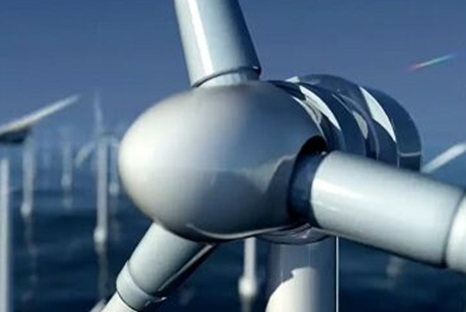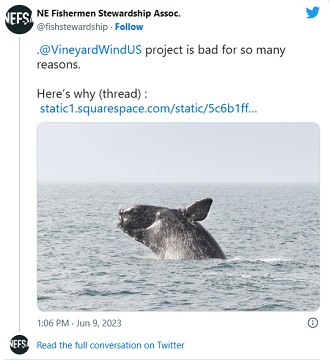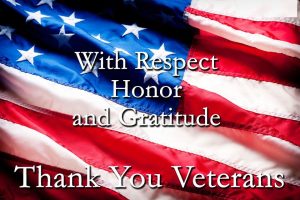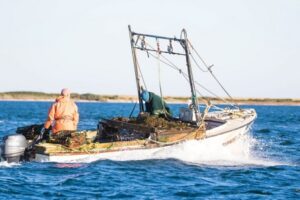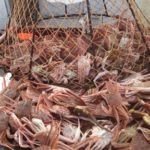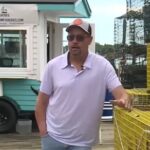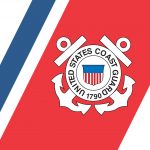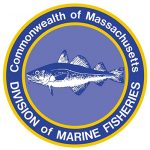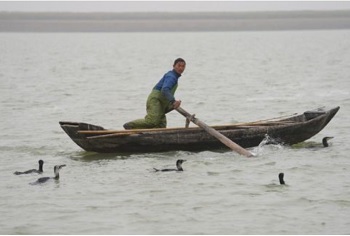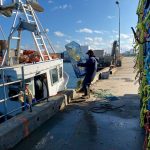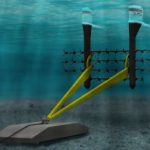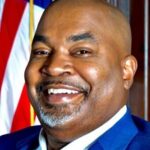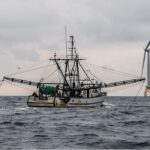Tag Archives: Jerry Leeman
With right-wing backing, New England offshore wind opponents gain strength
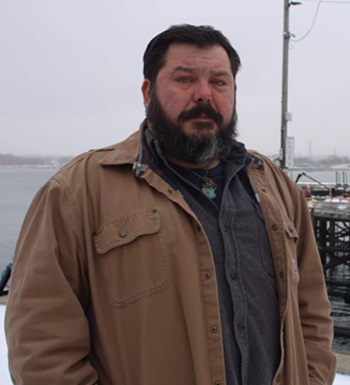 Jerry Leeman III is a fifth generation Maine fisherman and looks the part: broad shoulders, muscular hands, scraggly black beard with streaks of gray. Sitting at the head of an empty boardroom table in his South Portland office, he rails against the buildout of offshore wind currently getting underway in the Northeast. Leeman has read the government’s environmental assessments, and he’s heard scientific experts say turbines won’t destroy the marine ecosystem — but he doesn’t trust them. Plenty of fishermen in the Northeast feel they’re being squeezed out of existence by federal regulations and offshore wind development. But Leeman has a bigger platform than most. He founded and now leads the New England Fishermen’s Stewardship Association, better known as NEFSA. more, >>CLICK TO READ<< 06:18
Jerry Leeman III is a fifth generation Maine fisherman and looks the part: broad shoulders, muscular hands, scraggly black beard with streaks of gray. Sitting at the head of an empty boardroom table in his South Portland office, he rails against the buildout of offshore wind currently getting underway in the Northeast. Leeman has read the government’s environmental assessments, and he’s heard scientific experts say turbines won’t destroy the marine ecosystem — but he doesn’t trust them. Plenty of fishermen in the Northeast feel they’re being squeezed out of existence by federal regulations and offshore wind development. But Leeman has a bigger platform than most. He founded and now leads the New England Fishermen’s Stewardship Association, better known as NEFSA. more, >>CLICK TO READ<< 06:18
Trump has vowed to kill US offshore wind projects. Will he succeed?
 Opponents of offshore wind energy projects expect President-elect Donald Trump to kill an industry he has vowed to end on the first day he returns to the White House. “I believe this is a tipping point for the offshore wind industry in America,” said Robin Shaffer, president of Protect Our Coast NJ, one of the most vocal groups opposing offshore wind on the East Coast. “They have been given a glidepath by Democrat-run administrations at the federal and state level for many years. For this industry, (Tuesday’s) results will bring headwinds far greater than they have faced previously.” Commercial fishermen in Maine said they hope the Trump administration will undo policies designed to help build and approve offshore wind projects, saying regulators attempted to “future-proof” the industry against political change. Jerry Leeman, CEO of the New England Fishermen’s Stewardship Association, called on Trump to reverse a commitment to deploy 30 gigawatts of offshore wind by 2030. more, >>CLICK TO READ<< 06:37
Opponents of offshore wind energy projects expect President-elect Donald Trump to kill an industry he has vowed to end on the first day he returns to the White House. “I believe this is a tipping point for the offshore wind industry in America,” said Robin Shaffer, president of Protect Our Coast NJ, one of the most vocal groups opposing offshore wind on the East Coast. “They have been given a glidepath by Democrat-run administrations at the federal and state level for many years. For this industry, (Tuesday’s) results will bring headwinds far greater than they have faced previously.” Commercial fishermen in Maine said they hope the Trump administration will undo policies designed to help build and approve offshore wind projects, saying regulators attempted to “future-proof” the industry against political change. Jerry Leeman, CEO of the New England Fishermen’s Stewardship Association, called on Trump to reverse a commitment to deploy 30 gigawatts of offshore wind by 2030. more, >>CLICK TO READ<< 06:37
Days on the water, nights at Town Office: Harpswell lobsterman advocates for working waterfront on 7 committees
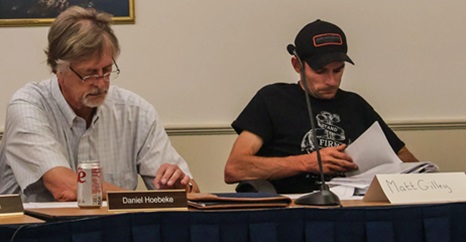 Matt Gilley stood in front of a shelf in his Cundy’s Harbor home. It holds a collection of marine oddities from the bottom of lobster traps, such as unique lobster claws, a seahorse, and a full-sized clam that grew inside a Coke bottle. “The fun part of it is, you don’t know what’s going to come up,” he said. Gilley himself is a rarity in Harpswell. In a town with 216 miles of coastline and “working waterfront” on many local signs, he is one of a small group of commercial lobstermen involved in town government, spending his mornings on the water and his evenings advocating for those who work on it. “I want to see lobstering continue, and the only way for that to continue is for there to be another generation,” he said. “If I can do anything to conserve what little we have left so other people can do it, I’m going to do it.” Photos, more, >>CLICK TO READ<< 09:10
Matt Gilley stood in front of a shelf in his Cundy’s Harbor home. It holds a collection of marine oddities from the bottom of lobster traps, such as unique lobster claws, a seahorse, and a full-sized clam that grew inside a Coke bottle. “The fun part of it is, you don’t know what’s going to come up,” he said. Gilley himself is a rarity in Harpswell. In a town with 216 miles of coastline and “working waterfront” on many local signs, he is one of a small group of commercial lobstermen involved in town government, spending his mornings on the water and his evenings advocating for those who work on it. “I want to see lobstering continue, and the only way for that to continue is for there to be another generation,” he said. “If I can do anything to conserve what little we have left so other people can do it, I’m going to do it.” Photos, more, >>CLICK TO READ<< 09:10
Against the Wind: Questions About BOEM’s Fisheries Analysis
 The Bureau of Ocean Energy Management (BOEM) announced the final sale notice for the Gulf of Maine offshore wind project lease areas on Sept. 16. The agency shrunk the overall area by 120,000 acres, removing significant portions of the two northern leases off the coast of Maine, carving a transit lane between the two farthest-offshore southern areas, and shaving small portions off other southern areas. This decision did little to satisfy Jerry Leeman, a Harpswell, Maine-based former commercial fisherman and founder of the New England Fishermen’s Stewardship Association (NEFSA), an organization that opposes the Gulf of Maine offshore wind area. NEFSA “remains steadfast in its opposition,” wrote Leeman in a press release, “despite the shrinking of the original areas.” more, >>CLICK TO READ<< 06:22
The Bureau of Ocean Energy Management (BOEM) announced the final sale notice for the Gulf of Maine offshore wind project lease areas on Sept. 16. The agency shrunk the overall area by 120,000 acres, removing significant portions of the two northern leases off the coast of Maine, carving a transit lane between the two farthest-offshore southern areas, and shaving small portions off other southern areas. This decision did little to satisfy Jerry Leeman, a Harpswell, Maine-based former commercial fisherman and founder of the New England Fishermen’s Stewardship Association (NEFSA), an organization that opposes the Gulf of Maine offshore wind area. NEFSA “remains steadfast in its opposition,” wrote Leeman in a press release, “despite the shrinking of the original areas.” more, >>CLICK TO READ<< 06:22
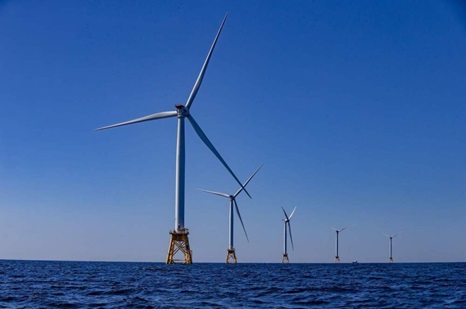
Mass. and Rhode Island pick 3 new wind projects, with less power than originally sought
Massachusetts and Rhode Island announced the winners of their joint offshore wind auction on Friday. While this total is less than half of what the states originally sought to procure, it helps bring them closer to their legally binding offshore wind targets. Friday’s news comes after nearly two years of economic tumult in the industry, when developers up and down  the East Coast canceled contracts for wind projects, saying they could not make them financially viable because of inflation, higher interest rates and supply chain problems. Still, not everyone is celebrating the news. Jerry Leeman, CEO of the New England Fishermen’s Stewardship Association, said he was “shocked” that the New England states are awarding more contracts less than two months after a blade broke off a Vineyard Wind Project turbine. In mid-July, the blade sent tons of fiberglass and foam debris into the ocean. Much of it washed up on the south side of Nantucket, and several beaches had to close while the material was cleaned up. more, >>CLICK TO READ<< 08:20
the East Coast canceled contracts for wind projects, saying they could not make them financially viable because of inflation, higher interest rates and supply chain problems. Still, not everyone is celebrating the news. Jerry Leeman, CEO of the New England Fishermen’s Stewardship Association, said he was “shocked” that the New England states are awarding more contracts less than two months after a blade broke off a Vineyard Wind Project turbine. In mid-July, the blade sent tons of fiberglass and foam debris into the ocean. Much of it washed up on the south side of Nantucket, and several beaches had to close while the material was cleaned up. more, >>CLICK TO READ<< 08:20

‘So-called expert bureaucrats’: Fishermen rip Sen Warren’s new plan to ‘silence’ them
America’s seafood leaders are pushing back on new plans from Democrats on Capitol Hill to revive a legal doctrine that fishermen say threatens to “silence” them. On Tuesday, Sen. Elizabeth Warren, D-Mass., led several of her Democrat colleagues in introducing the Stop Corporate Capture Act (SCCA), which she says is aimed at stopping corporations from “hijacking” the government. With the new threat of the Chevron doctrine finding permanence in federal law, New England fishermen are crying foul and pointing to the recent offshore wind disaster wreaking havoc on the Massachusetts island of Nantucket as a prime example of why lawmakers should not give “expert bureaucrats” power over their industry. Photos, more, >>CLICK TO READ<< 06:45
Vineyard Wind crisis: Fishermen blast feds for saying they don’t care about whales
 The claim came during a Thursday hearing in Boston federal appeals court as two fishing groups look to toss Vineyard Wind’s underlying permit, arguing regulators failed to analyze how the project would impact the environment and fishermen. “The alliance, as a trade association representing the fishing industry, does not have any interest in protecting right whales,” said attorney Thekla Hansen-Young, representing the Department of the Interior, the National Marine Fisheries Service, among other federal agencies, in the dispute. Hansen-Young was referring to the Responsible Offshore Development Alliance, one of the groups fighting the feds and Vineyard Wind. Seafreeze Shoreside Inc. is the other. more, >>CLICK TO READ<< 13:06
The claim came during a Thursday hearing in Boston federal appeals court as two fishing groups look to toss Vineyard Wind’s underlying permit, arguing regulators failed to analyze how the project would impact the environment and fishermen. “The alliance, as a trade association representing the fishing industry, does not have any interest in protecting right whales,” said attorney Thekla Hansen-Young, representing the Department of the Interior, the National Marine Fisheries Service, among other federal agencies, in the dispute. Hansen-Young was referring to the Responsible Offshore Development Alliance, one of the groups fighting the feds and Vineyard Wind. Seafreeze Shoreside Inc. is the other. more, >>CLICK TO READ<< 13:06
Fishermen Join Lawsuit Against Vineyard Wind After Blade Failure
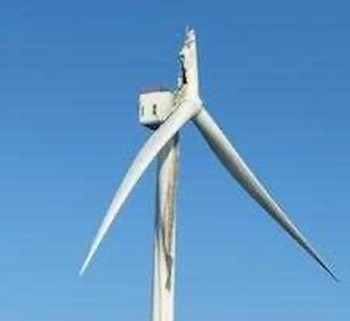 The New England Fishermen’s Stewardship Association (NEFSA) has called for the First U.S. Circuit Court of Appeals to reconsider the dismissal of a lawsuit against the Department of the Interior regarding the safety of Vineyard Wind’s turbines. The case, RODA v. Department of the Interior, is scheduled for oral arguments on Thursday. Jerry Leeman, CEO of NEFSA, highlighted recent issues related to the Vineyard Wind project, particularly a blade malfunction that resulted in debris being scattered across important fishing areas. “The Responsible Offshore Development Alliance (RODA) put the government on notice over two years ago that Vineyard Wind’s turbines aren’t safe. The recent blade disaster has scattered debris over a huge swath of historic fishing grounds, creating serious hazards for mariners and marine life,” Leeman stated. more, >>CLICK TO READ<< 07:59
The New England Fishermen’s Stewardship Association (NEFSA) has called for the First U.S. Circuit Court of Appeals to reconsider the dismissal of a lawsuit against the Department of the Interior regarding the safety of Vineyard Wind’s turbines. The case, RODA v. Department of the Interior, is scheduled for oral arguments on Thursday. Jerry Leeman, CEO of NEFSA, highlighted recent issues related to the Vineyard Wind project, particularly a blade malfunction that resulted in debris being scattered across important fishing areas. “The Responsible Offshore Development Alliance (RODA) put the government on notice over two years ago that Vineyard Wind’s turbines aren’t safe. The recent blade disaster has scattered debris over a huge swath of historic fishing grounds, creating serious hazards for mariners and marine life,” Leeman stated. more, >>CLICK TO READ<< 07:59
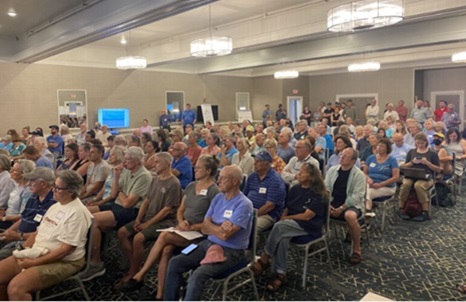
BOEM Hears Mostly Opposition at a Meeting in Eastham
Local officials on the Outer Cape have for a month been calling for the Bureau of Ocean Energy Management (BOEM) to hold a public information session here about one of eight proposed wind energy areas in the Gulf of Maine — the one sited about 20 miles off Cape Cod’s back shore — before its size and shape are approved. BOEM, the agency of the Dept. of Interior that is charged with managing the development of offshore wind, finally did that on June 17, and some 200 people turned out at the Four Points by Sheraton for it. BOEM announced the meeting only six days before it was held. Statements about possible negative effects of the development on commercial fishing dominated the meeting. Many of those who spoke identified themselves as fishermen or the wives of fishermen and said that they feared their livelihoods would be lost because of the construction of wind turbines. Truro lobsterman Dana Pazolt said he believes the cables would serve as a barrier to lobster migration. “You run the wires across the seabed, our industry is dead,” he said. more, >>CLICK TO READ<< 20:43
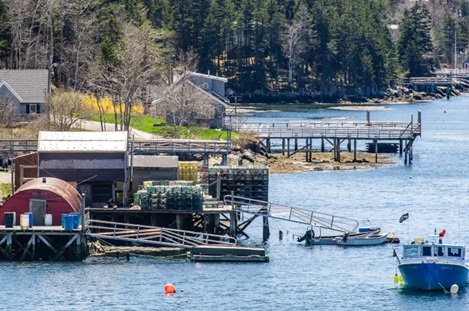
Harpswell adopts ‘right to fish’
Harpswell has a new right-to-fish policy intended to protect the town’s working waterfronts and fishermen. “We have a sign when you come into town saying we’re a working waterfront community. We’re pushing the town to do more than just a sign,” Cundy’s Harbor fisherman Matt Gilley, who helped develop the policy, told the Anchor before the meeting. The Harpswell Select Board approved the policy unanimously on July 11, but not before some tense exchanges between board members and advocates. The policy commits the town to several actions. Speaking to the Anchor, Gilley emphasized a provision protecting fishermen from nuisance complaints about sights, sounds or smells that might result from fishing activities, like operating boat engines or storing fishing traps on private property. Maine law already prevents such complaints against fishermen who are operating in line with applicable laws or rules. more, >>CLICK TO READ<< 13:38
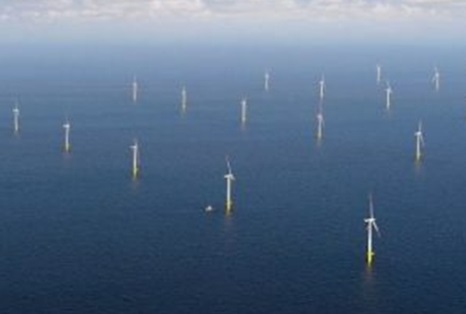
Offshore wind farm lease auction plan has Gulf of Maine fishermen feeling brushed aside
The prospect of hundreds of offshore wind turbines generating power in the Gulf of Maine is moving forward with plans to auction eight leases in a large swath of waters off the New England coast. Jerry Leeman III, the CEO of the New England Fishermen’s Stewardship Association, said there’s not enough data to support the areas that have been chosen for wind development. As now laid out, the plan could take away valuable fishing grounds from New England’s fishing fleet, pose navigational hazards and create new environmental threats, he said. “We still have more questions than we have answers,” he said. “Yet we’re moving ahead with the leasing ahead of the science.” more, >>CLICK TO READ<< 12:37
Collins vows to help rebuild Harpswell waterfront during visit
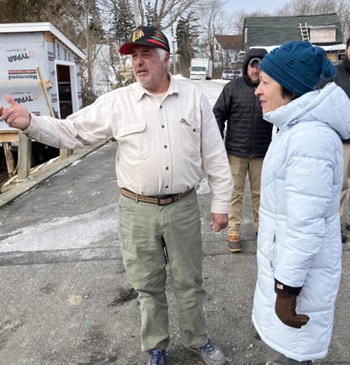 U.S. Sen. Susan Collins, R-Maine, vowed to help secure funding to rebuild Harpswell’s storm-damaged working waterfront during a visit to the town on Saturday, Jan. 20. Collins, who visited Henry Allen’s Seafood on Lookout Point and two other heavily damaged sites on Bailey Island, called the destruction “heartbreaking.” “I want to do everything that I can to try to secure assistance, working with the governor, with the local community, with the rest of the (congressional) delegation, in order to assist these families in their time of need,” Collins said before a group of lobstermen and other waterfront workers and advocates during her visit. “The devastation is incredible.” phootos, more, >>click to read<< 07:15
U.S. Sen. Susan Collins, R-Maine, vowed to help secure funding to rebuild Harpswell’s storm-damaged working waterfront during a visit to the town on Saturday, Jan. 20. Collins, who visited Henry Allen’s Seafood on Lookout Point and two other heavily damaged sites on Bailey Island, called the destruction “heartbreaking.” “I want to do everything that I can to try to secure assistance, working with the governor, with the local community, with the rest of the (congressional) delegation, in order to assist these families in their time of need,” Collins said before a group of lobstermen and other waterfront workers and advocates during her visit. “The devastation is incredible.” phootos, more, >>click to read<< 07:15
The Supreme Court can save working fishermen from Biden regulators
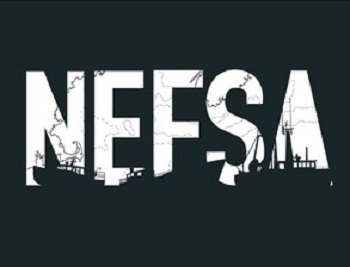 The crew and I had been trawling the Gulf of Maine for several days aboard the F/V Teresa Maria IV, the commercial fishing vessel I captained for 14 years. I had only just settled into my bunk for a few hours of sleep. That’s when the rogue wave hit. Life at sea is never predictable. A promising forecast could give way at any time to a squall with heavy swells. Essential navigation components might break. On that night, circumstances coalesced such that a rogue wave knocked my boat clean over. We were capsized in the black of night. This unsettling experience was front of mind when my organization, the New England Fishermen’s Stewardship Association (NEFSA) filed an amicus brief in an upcoming Supreme Court case about the Biden administration’s power over the fishing industry. photos, more, >>click to read<< 06:46
The crew and I had been trawling the Gulf of Maine for several days aboard the F/V Teresa Maria IV, the commercial fishing vessel I captained for 14 years. I had only just settled into my bunk for a few hours of sleep. That’s when the rogue wave hit. Life at sea is never predictable. A promising forecast could give way at any time to a squall with heavy swells. Essential navigation components might break. On that night, circumstances coalesced such that a rogue wave knocked my boat clean over. We were capsized in the black of night. This unsettling experience was front of mind when my organization, the New England Fishermen’s Stewardship Association (NEFSA) filed an amicus brief in an upcoming Supreme Court case about the Biden administration’s power over the fishing industry. photos, more, >>click to read<< 06:46
Fishermen slam Biden admin’s offshore wind push as threat to jobs, sea life
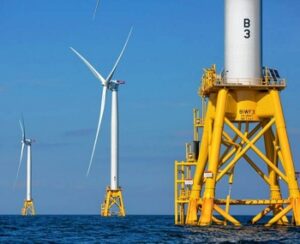 The New England Fishermen’s Stewardship Association (NEFSA) on Monday released an Offshore Wind Research Summary, a compilation of scholarly articles that identify dangers offshore wind farms pose to ocean ecosystems. “We cannot industrialize the Gulf of Maine until we understand how the wind industry interacts with the fisheries that wild harvesters have stewarded responsibly for decades,” said Jerry Leeman, NEFSA CEO and a longtime commercial fishing captain. Leeman says that the government’s attempt to justify wind farms leans on “voodoo science” because the proper methods and sufficient amount of time have not been applied. “The problem is the science that wraps around the science, the whole purpose for it is misinterpreted to the public through the fact that they think they’re getting real, accurate science,” Leeman said. >click to read<
The New England Fishermen’s Stewardship Association (NEFSA) on Monday released an Offshore Wind Research Summary, a compilation of scholarly articles that identify dangers offshore wind farms pose to ocean ecosystems. “We cannot industrialize the Gulf of Maine until we understand how the wind industry interacts with the fisheries that wild harvesters have stewarded responsibly for decades,” said Jerry Leeman, NEFSA CEO and a longtime commercial fishing captain. Leeman says that the government’s attempt to justify wind farms leans on “voodoo science” because the proper methods and sufficient amount of time have not been applied. “The problem is the science that wraps around the science, the whole purpose for it is misinterpreted to the public through the fact that they think they’re getting real, accurate science,” Leeman said. >click to read<
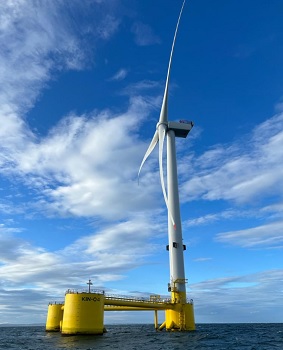
Leeman: Maine must hit pause on offshore wind turbines
You wouldn’t buy a house without an inspection, so why would we fill the Gulf of Maine with wind turbine superstructures without understanding how they interact with the marine environment? Offshore wind energy features too many unknowns to proceed at this point with widescale ocean industrialization. That’s why my organization, the New England Fishermen’s Stewardship Association (NEFSA) has joined with partner organizations to call on state and federal authorities to reset our renewable energy policy. The state of Maine is developing a floating offshore wind research array at a 15-square-mile site in the Gulf of Maine. >click to read< 08:17
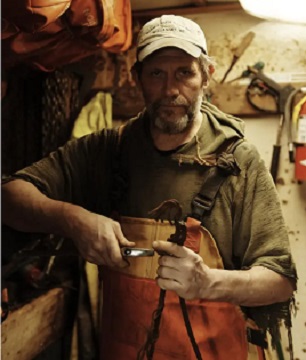
How foreign private equity hooked New England’s fishing industry
The 85-foot trawler, deep green and speckled with rust, was returning from a grueling fishing trip deep into the Atlantic swells. As sunrise broke over New Bedford harbor, the fish were offloaded in plastic crates onto the asphalt dock of Blue Harvest Fisheries, one of the largest fishing companies on the East Coast. About 390 million pounds of seafood move each year through New Bedford’s waterfront, the top-earning commercial fishing port in the nation. Leeman and his crew are barely sharing in the bounty. On deck, Leeman held a one-page “settlement sheet,” the fishing industry’s version of a pay stub. Blue Harvest charges Leeman and his crew for fuel, gear, leasing of fishing rights, and maintenance on the company-owned vessel. Across six trips in the past 14 months, Leeman netted about 14 cents a pound, and the crew, about 7 cents each — a small fraction of the $2.28 per pound that a species like haddock typically fetches at auction. Photos, >click to read< 12:04

We’re Being Regulated Out of Business, New England Fishermen Say
“The New England fishermen are the most regulated fishermen in the world,” Jerry Leeman says. Leeman has been fishing in Maine his entire life. His father, grandfather, and great-grandfather were all fishermen. Federal regulations have now reduced the amount of haddock landings for commercial fishermen by more than 80%, Leeman said. The reduction in fish that fishermen are allowed to catch and “offshore wind development,” which is taking over “just under 10 million acres” of ocean, prompted Leeman, along with fisherman Dustin Delano, to create the New England Fishermen’s Stewardship Association to advocate for the region’s fishermen. Video, listen to the podcast >click to read< 07:55
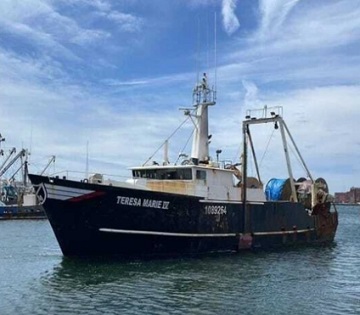
Environmental Regulations and Wind Turbines Are Backing New England Fishermen into a Corner
Just three weeks ago, Jerry Leeman was a commercial fishing captain in New England and a very successful one at that. Now, as executive director of the newly formed New England Fishermen Stewardship Association, he’s leading the charge against Biden administration policies that threaten the industry he loves, including overregulation and wind-turbine development in the Gulf of Maine. Leeman said that he and fellow New England fishermen have serious concerns about the accuracy of the NOAA data. Fish-population assessments fell to the wayside during the Covid years — 2021 and 2022 — and the data-collection process has not yet been corrected. “Whether you’re a lobsterman or a ground fisherman, a trend up and down the coast here is that nobody wants wind turbines placed in our environment. It’s going to mess up our stocks and our species. Not to mention it’s going to change the viability for generations to come in the fishing grounds,” Leeman said. Photos, >click to read< 07:51

New fishermen’s alliance seeks to fight back against Biden admin’s ‘hostile’ attacks
Marine industry stakeholders are joining forces this week to establish the New England Fishermen Stewardship Association (NEFSA), a first-of-its-kind effort to fight back against federal regulations targeting fishermen. “Fishermen and fishing communities are facing oblivion thanks to their own government,” Jerry Leeman, who will serve as NEFSA’s executive director, told Fox News Digital. “Hostile regulators are steadily eroding our ability to make a living, while the offshore wind industry threatens the fleet’s access to productive fishing grounds and disrupts the aquatic environment.” “Almost no one is standing up for New England’s working families, so NEFSA will,” said Leeman. >click to read< 08:38
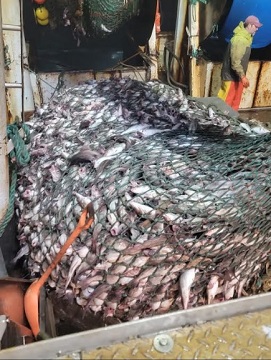
Jerry Leeman: So, let’s plug in what we know.
So, let’s run a logical thought, based on what our governments assumption on fish stocks is, with what we know. NOAA says there is nothing wrong with the biomass of white hake, but they cannot find adolescent hake. Well ask any lobstermen along the shorelines, they are seeing abundance of juvenile hake and cod in their traps. Imagine Lobstermen and inshore fishermen across a vast area all saying the same thing? NOAA says there’s nothing wrong with the biomass of haddock but same thing, they can’t find small fish. Well, what do we know?!! >click to continue reading< 08:33
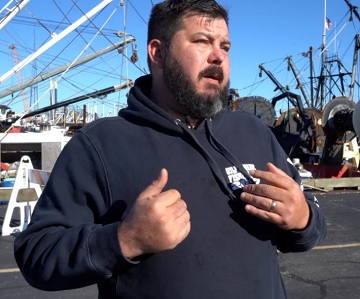
Commentary: Fishing rules are strangling honest, hard-working, blue-collar fishermen
I’m not a fortune teller; I’m just a fisherman. I have no vested interest, other than it’s a job. My job employs thousands, and that keeps those lives turning. When the last fish is landed, it’s all over. Men and women will not and should not go to sea and risk their lives for nothing. I truly wish people with any sense at all would stand up and push against this. But they’ve created a problem where there wasn’t one, and the chain that binds us all will break shortly. Video, >click to read< 08:03
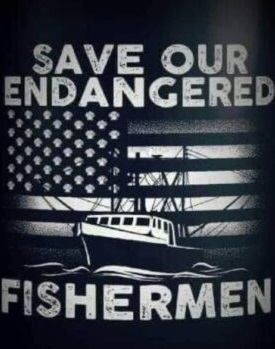
All for one and one for all – With Jerry Leeman
Well, if NOAA goes through with these cuts this coming year to groundfish stocks I’m afraid there won’t be a fishing season next year. They have created choke species thru faulty assessments. I don’t know why I say assessments because they really haven’t done enough to make any logical cuts to any stock. To my family and friends who are lobstermen. You will watch the bait prices double overnight once the last groundfish boat is done. No more bait will be landed thru the groundfish efforts. That’s right no redfish racks, no hard bait and no skates. This will happen. I’ll do my best to argue everyone’s circumstances and the errors of their data and sampling methods using on the job experience offshore for 14 years at sea in the last 21 years. The entire groundfish fleet Captains are united in this argument that the data is corrupt and wrong in many ways. All offshore fishermen spend more time trying to avoid fish due to the made-up choke species brought to us by bad science and lack of know how. >click to continue reading<, 15:03

Are we really going to let them kill our ocean and our fishing way of life?
Generations of fishermen are no longer fishing because of the restrictions and unfair quota from faulty science. Like I said in earlier posts, we went from 400 active boats down to 17 barely active boats. Meanwhile conservation groups will tell you that we are wiping the ocean out from overfishing. That is so wrong on so many levels, it isn’t even funny. Hard to believe New England was considered to be sustainable for haddock and lobsters. Then fishing efforts went down and now we are no longer sustainable. The only thing that’s changed is windmills are on their way to the Gulf of Maine and the management at NOAA and NMFS are allowing it to happen. Why would they not talk to the people who have committed their lives to the job of harvesting our ocean?! Well, I can’t speak for everyone, but I have a few hypotheses. By Jerry Leeman. >click to read< 16:38
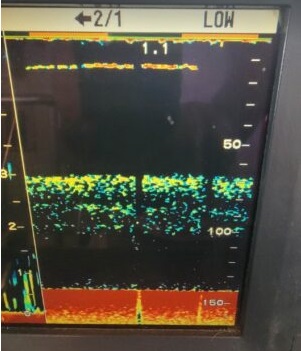
Jerry Leeman – Why it is wrong to assume anything
I’ll use this photo to prove a point. NOAA uses a computer to pick where their assessments on fish stocks will take place. Here lies the problem. It’s in random spots, and they never make the same tow again at the same time of the year because they use a computer model that knows nothing of fishing. NOAA is taking the assumption that fish live everywhere. That’s pretty funny because if you knew anything about fishing at all, fish species don’t hang on every piece of bottom all day and night. They just don’t. Not only do fish have tails, but they also swim up into the water columns and travel with the feed and breeding cycles and changes of the seasons. >click to read the rest< by Jerry Leeman.16:16
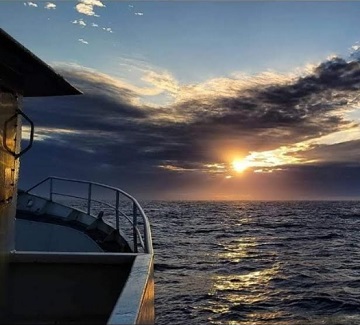
Jerry Leeman: Fishing is my life. Somewhere, people forgot to listen to the generations before us.
I’ve spent all my life on the ocean. My family and friends are fishermen and lobstermen. I grew up on an island in Maine and almost everyone was in some form of fishery, whether it be groundfishing, gill netting, seining and lobstering. We even had shrimping till that was mis managed away. I grew up watching these men and women harvesting the ocean. Rules were put into place to harvest the ocean responsibly and sustainably for future generations. Most people in this nation know little to as of why our fish stocks became depleted. Other nations like Russia and other European super trawlers were allowed to pillage our waters along the New England coast. They were eventually banned, but the destruction had been done. We’ve spent years restricting ourselves fishing, going out of our way bending backwards to rebuild our fish stocks. >click to read< By Jerry Leeman 11:19
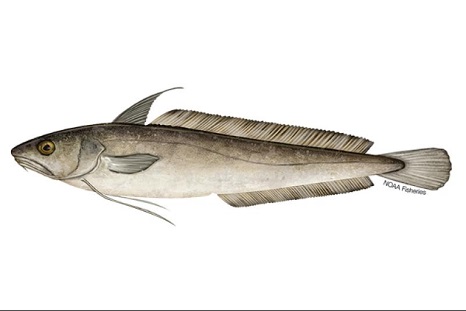
Jerry Leeman – A supply line disruption
Allow me to explain what is about to happen. We are fishing on false assumptions that there are no white hake. If you are a fisherman, I’m sure you can tell that is untrue. Regardless of the price of fuel rising and this hake quota brought to us by NOAA and NMFS. It’s become a supply line disruption. The infrastructure needs a steady supply of fish to keep steady markets open. Here lies the problem. Fishermen are going out of their way to avoid a specie that live in the same habitat as other species. So, for the sake of the hake restriction, they are avoiding those areas. So that means the supply line is cut for the other species. Which means cutting houses and fish markets are paying for folks to sit idle. No supply no product no income. So, they have to lay off folks. Please read the rest. >click to read< By Jerry Leeman 08:40






